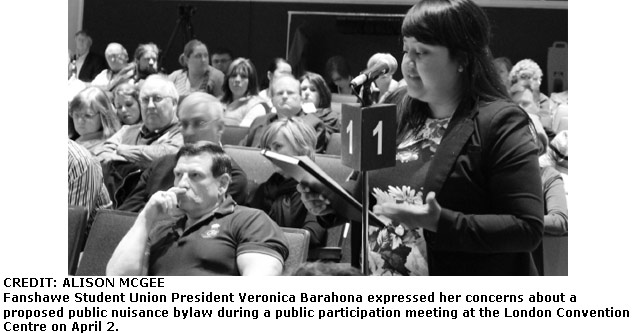Proposed public nuisance bylaw put on hold after public participation meeting

The City of London Council members held an open forum meeting of the Public Safety Committee on April 2 to allow members of the public to voice their opinions on a proposed public nuisance bylaw.
The Proposal
The proposed bylaw, the entirety of which can be found on the City of London's website (london.ca), essentially aims to give police officers more authority when it comes to preventing unlawful assemblies. The move is a reaction to the St. Patrick's Day riot that occurred on Fleming Drive near Fanshawe College, as well as other similar incidents in the past.
The full document is a hefty read full of legal jargon, but it essentially boils down to giving police officers the authority to break up a party on private property, including inside a private residence, if they feel it could escalate.
The term “nuisance party” is being used to describe the types of parties police would be able to dissipate. In order to classify a gathering as a nuisance party, police would have to witness any of the following: disorderly conduct, public intoxication, the unlawful sale of alcohol or controlled substances, littering, damage of public property, illegal parking, unreasonable noise, open burning, public disturbances and public urination or defecation.
The Committee
The public participation meeting was held at the London Convention Centre to accommodate the larger than average crowd; approximately 150 people were in attendance. Orest Katolyk, the Manager of Licensing and Municipal Enforcement Services for the City of London, cited a number of laws similar to the proposed bylaw already in effect in U.S. cities.
East Lansing Michigan instituted a similar law after a 1999 sporting event that led to over 10,000 students congregating in the streets, starting fires and destroying police vehicles. Katolyk was quick to assure council members that bylaws mirroring the one that he is proposing, particularly in East Lansing, have proven successful in the U.S.
London Police Chief Brad Duncan spoke to the council about the need for police officers to have more control over party situations. “We need an opportunity to go in and quell things,” Duncan said, referring to police's current inability to intervene in parties on private property. Duncan also told council how things may have unfolded differently on St. Patrick's Day if the police had had that power.
Public Participation
After the formalities of the council speeches, the discussion was opened to members of the public. Over 20 London and area residents got up to speak their minds on the issue.
Of note among the public speakers was Pauline House, a resident of Huron Street close to Fanshawe College. She spoke strongly about the fears many permanent residents have regarding students homes coming in to their neighborhood. “We panic every time we see that For Sale sign,” she said, before relating her own personal anecdotes about student disturbances in her neighbourhood.
Other concerns were raised from people who had purchased single family homes in neighbourhoods that were then overrun by student rentals, as were concerns involving a student code of conduct. Sandra Borson, who lives near the Western campus, asked Police Chief Duncan, “Why were 1,000 people even allowed out on that street that night?” Others offered solutions of imposing restrictions on the number of students allowed in a single family home, such as the restrictions that exist in Oshawa.
Veronica Barahona, President of the Fanshawe Student Union, took the time to address concerns that “the wording in the bylaw is too vague, too immediate and too reactive.”
Edgar Alan Smuck, who wrote a letter to council members, which was attached to the meeting's agenda, was angry about the lack of preparation time given to citizens to respond to the bylaw.
Oliver Hobson echoed this sentiment, accusing the council members of “giving the appearance of citizen engagement as you try to ram this thing through.” The public was given 48 hours from the time the bylaw was posted online to the deadline for written responses.
In another letter attached to the night's agenda, Fanshawe College President Dr. Howard Rundle wrote, “Fanshawe College supports the City of London's proposal to amend the public nuisance bylaw ... we believe these amendments — giving law enforcement officials more authority to respond to nuisance parties in the city — can play an important role in addressing disruptive behavior.” Dr. Rundle did not speak publicly at the meeting.
Ultimately, after hearing from the public for nearly two hours, Councillors Bill Armstrong and Paul Hubert spoke in favour of delaying any action on the bylaw until further consideration could be given to it.
For more information on the meeting, updates on the bylaw and to view the entire proposal, visit london.ca.













